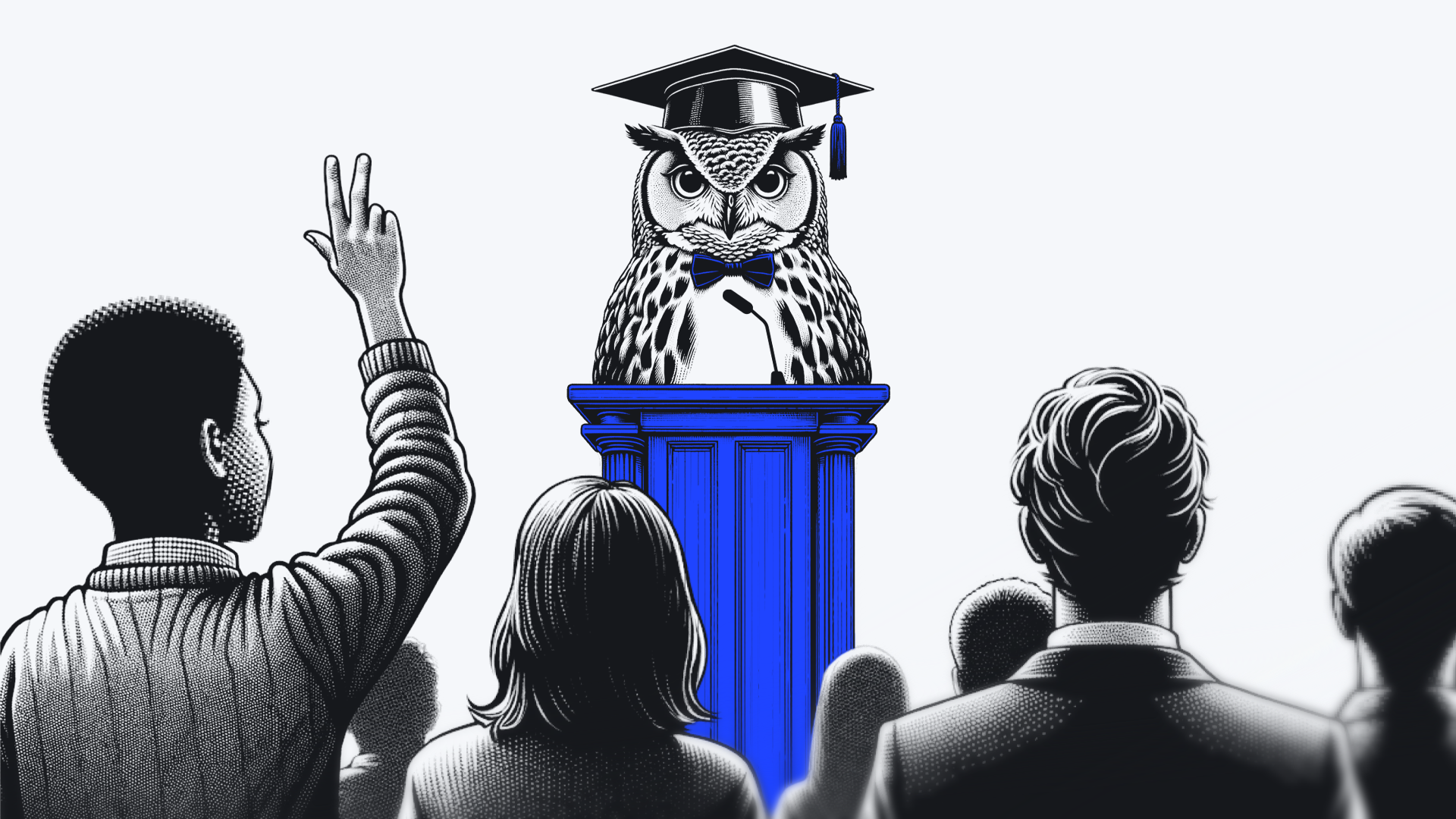March 27, 2025
The AI Power Players: Who’s Influencing the Narrative? And What Can Business Leaders Learn from These Voices?

Artificial intelligence is one of the most consequential technological advancements of our time. Already, AI is shaping the future of industries, changing economies, and altering work for many of us. But the hype around the technology has also spurred an online race among industry leaders, researchers, entrepreneurs, policymakers, and commentators to become global thought leaders on the topic.
In a landscape flooded with voices, which are actually shaping the AI narrative? That’s what we sought out to find.
True influence isn’t just about visibility. It’s about directing the conversation in meaningful ways — introducing new ideas, shifting public perception and setting the agenda for how AI is discussed and understood. The loudest voices aren’t always the most influential. And volume doesn’t always translate to impact. Lesser-known figures, such as researchers, developers and niche thought leaders, may lack massive followings but wield disproportionate influence. They frame key debates, introduce groundbreaking insights and have their ideas amplified by industry decision-makers. Their contributions don’t just circulate —they alter the trajectory of AI discourse itself.
This study goes beyond surface-level metrics to uncover who is truly influencing conversations, narratives and opinions around AI. Instead of relying solely on follower count or post volume, we analyze a range of factors — including engagement depth, amplification, network influence, cross-platform presence and narrative impact — to create a more accurate picture of who is shaping the AI narrative.
While we spotlight the top 12 below, many other influential voices are contributing to the conversation in powerful ways — some of whom we highlight later in this piece.
The top 12 AI influencers

Decoding the results
What makes an influencer?
Elon Musk
A now inescapable figure in global business and politics, Musk’s social posts often blend bold AI predictions, critiques of competitors, and promotion of his own ventures, like xAI. He frequently frames AI as a transformative force — both as a societal boon and a potential risk — while injecting humor, memes and provocative takes.
- Reach and engagement: Musk’s statements are widely reported by media outlets, which extends their reach beyond his immediate audience. As owner and most-followed user of X, formerly known as Twitter, Musk’s posts reach hundreds of millions of people and achieve massive visibility, often garnering tens of thousands of likes, retweets and replies within hours.
- Sentiment shaping: Musk oscillates between optimism and alarmism, helping to enhance his credibility. And his ongoing feuds with other leading AI voices, like Altman or LeCun, build an authenticity that makes Musk so captivating to practitioners, policymakers and a general audience alike.
- Impact: Spanning 18 hours, Musk’s January 2025 tirade against Sam Altman’s Stargate announcement showcased his ability to dominate attention — even in an incredibly crowded media cycle.
Lex Fridman
Host of his own self-titled podcast, Fridman is known for thoughtful, curiosity-driven discussions with AI luminaries. He avoids sensationalism and emphasizes technical nuance. He also spends considerable time probing human-AI interplay, including reflecting on consciousness, AGI potential and the impact on society. While Fridman’s posts are less “viral” than others, they’re highly respected within AI circles.
- Reach and engagement: With a dedicated follower base, Fridman’s posts see steady engagement, often reaching hundreds to thousands of likes and retweets — especially when referencing high-profile guests like Musk or Altman. His ideas circulate among tech enthusiasts and academics, often shared as insightful snippets or quotes from his podcasts. His interviews are frequently referenced in media articles, extending their influence.
- Sentiment shaping: Fridman presents balanced perspectives and gives his guests space to share their diverse views, contributing to a more informed public understanding of AI — and many other topics. Fridman takes a calm, inquisitive tone, countering hype with measured optimism. He rarely polarizes, and encourages dialogue over dogma.
- Impact: Donald Trump, Bernie Sanders, Elon Musk, Jeff Bezos; Fridman’s diversity of high-profile guests across business, politics, academia and media is a testament to his influence and the space he’s built for meaningful conversation.
Sam Altman
Strategic and restrained, Altman largely eschews rabble-rousing and instead focuses on defending OpenAI’s mission, downplaying rival critiques, and offering broad optimism about AI’s societal benefits. He aims for credibility over sheer virality. But when Altman veers into more controversial territory, it usually dominates headlines and discourse in the AI community. Meanwhile, Altman’s transparency around OpenAI’s operations helps cultivate an authenticity that keeps fans engaged and media intrigued.
- Reach and engagement: With roughly 2 million followers, Altman’s posts get thousands of likes and reposts, often spiking after major announcements or controversies, including the Stargate roll-out and subsequent backlash from Musk.
- Sentiment shaping: Altman devotes most of his time online to advocating for responsible AI development and attempting to influence public sentiment towards a cautious yet progressive view on AI adoption. He projects confidence and benevolence and counters AI fear-mongering by promoting responsible development and deployment. Don’t be fooled though: Altman’s clashes with Musk reveal a highly competitive edge and a savvy operator who knows when to press his advantage.
- Impact: It’s Altman’s seemingly off-the-cuff, unguarded posts that are often the most intriguing, like admitting that OpenAI loses lots of money on ChatGPT. And the Stargate announcement showed just how well Altman knows how to make a splash — and time it for maximum impactful.
Satya Nadella
As CEO of Microsoft, Nadella regularly shares updates on Microsoft's AI initiatives, emphasizing ethical AI development and integration across products. His organic social content is often tied to Microsoft’s strategy, progress and ethics. He avoids personal takes or controversies, focusing on practical applications over philosophy. Instead, it’s Nadella’s appearances on podcasts, like the recent discussion with Dwarkesh Patel, and at industry events that often elicit the most interesting comments and ignite debate across the AI industry.
- Reach and engagement: Nadella receives substantial engagement on LinkedIn, which Microsoft owns, and X, reflecting his leadership position and the public's interest in Microsoft's direction.
- Sentiment shaping: Nadella reinforces a pragmatic, business-friendly AI narrative, urging a focus on “useful tools” and “building for the real world,” instead of theoretical discussion.
- Impact: Few people can move financial markets with their remarks in the way Nadella can. And his recent comments about quantum computing sparked intense debate about the likelihood of the technology reaching commercial viability.
Brian Roemmele
One of the true “internet personalities” in AI, Roemmele posts prolifically about the technology, blending futurism with historical parallels and practical insights, like AI’s impact on cognition or commerce. He’s enthusiastic and accessible, often threading together long-form takes that keep a niche but passionate audience deeply engaged.
- Reach and engagement: His social content gets hundreds of likes and retweets from AI enthusiasts and early adopters. His ideas spread within tech-forward communities, often shared as “hidden gem” perspectives. He’s not mainstream, but is hugely influential among audiences like voice technology enthusiasts.
- Sentiment shaping: Roemmele cultivates excitement and wonder about AI, framing it as a human augmentation tool. He rarely delves into risks, and instead maintains a positive outlook on AI's future, while subtly shifting conversations toward practical optimism and less-hyped applications.
- Impact: It was Roemmele’s online presence that first got academic and author Jordan Peterson’s attention. Now, the two are working together on a new AI project.
Ethan Mollick
Wharton Professor Mollick’s social activity centers on AI’s real-world implications, namely its impact on education, work and creativity. He shapes AI discourse by bridging theory and practice, influencing how users perceive AI’s immediate societal effects. Mollick often uses data or examples, like how AI is disrupting homework. His posts are sharp, witty and grounded in observation.
- Reach and engagement: Mollick’s posts get strong engagement and attract attention from academics and professionals. Due to their relevance and clarity, they often spark discussions on AI's business applications. Mollick also regularly posts long-form content on his blog, “One Useful Thing.”
- Sentiment shaping: Mollick balances enthusiasm with caution, highlighting AI’s “weird stuff” without overhyping. He tempers utopianism with realism.
- Impact: Mollick’s most impactful social posts and blogs are those that provide actionable insights, including helping listeners and readers identify the AI tools they should be using now.
Eric Topol
The founder and director of the Scripps Research Translational Institute, Topol almost exclusively posts about AI's impact on healthcare. He highlights relevant innovations and studies, and poses important ethical questions about AI’s use in medical settings. His tone is evidence-based and forward-looking.
- Reach and engagement: On X, Topol’s posts about AI developments in healthcare receive solid engagement, especially among medical and tech audiences. But while his ideas initially spread in health-tech circles, they’re often referenced by professionals and amplified by other authoritative voices.
- Sentiment shaping: Topol promotes cautious optimism, emphasizing AI’s potential to enhance medicine while flagging risks like bias.
- Impact: Topol’s work highlighting the ethical and practical applications of AI in medicine, including a recent “New York Times” op-ed, have helped to remove the stigma around the technology.
Kirk Borne
A former professor, executive advisor and data practitioner, Borne often shares thoughts about AI news, tools and trends, with content typically tailored to data scientists. His posts are educational, and link to external resources or spur open dialogue about AI’s future.
- Reach and engagement: Active on X and LinkedIn, Borne’s posts get steady engagement from a broad audience interested in data science and AI. His content is regularly shared within analytics and AI education communities, and valued for its curation rather than its originality.
- Sentiment shaping: He takes a positive, learning-oriented view of AI, rarely diving into controversies.
- Impact: Borne is often listed as one of the world’s top digital influencers for his work in shaping AI and influencing beginners and practitioners with his low-key, informative presence.
Andrew Ng
With a long history in data and AI, including starting Google Brain, Ng regularly shares insights on AI advancements, educational resources and industry applications, emphasizing the democratization of AI knowledge. His social posts focus on AI education, accessibility and applications, like democratizing AI learning. He’s concise, optimistic, and avoids drama.
- Reach and engagement: Ng posts often receiving significant interactions, reflecting his status as an AI educator. His ideas spread in both academic and industry circles, extending his influence beyond his immediate audience.
- Sentiment shaping: Ng projects inclusivity and hope, framing AI as a universal opportunity rather than an elite battleground.
- Impact: As co-founder of Coursera, Ng has helped eliminate educational barriers to the technology by sharing training resources that help users of all technical backgrounds discover practical use cases for AI.
Demis Hassabis
The CEO of DeepMind, Hassabis regularly shares updates on the company’s groundbreaking AI research and its use in solving complex scientific problems. He also advocates for more responsible AI development, and the technology’s potential to transform healthcare. His tone is understated and scientific.
- Reach and engagement: Hassabis maintains an active presence on X, with posts garnering attention from both the scientific community and the general public.
- Sentiment shaping: He emphasizes the potential of AI to address global challenges, and advocates for AI as a tool for societal good, relying on a serious, research-driven AI narrative to avoid hype or fear.
- Impact: A 2024 Nobel Prize winner, Hassabis’ regular cadence of posts touting DeepMind's achievements have helped to demonstrate AI's capability in tackling complex issues, inspiring confidence in the technology’s ability to bring positive, global change.
Yann LeCun
LeCun, chief scientist at Meta AI, mixes AI advocacy and technical rebuttals with a focus on promoting open-source innovation. He’s combative yet cerebral, often challenging what he sees as hype over reality.
- Reach and engagement: Active on X, his posts get thousands of likes and stimulate discussions among AI researchers and enthusiasts, ultimately spreading beyond the social platform. He’s frequently cited in media articles about AI’s trajectory and control.
- Sentiment shaping: LeCun takes a pragmatic, anti-alarmist stance to AI. He encourages a balanced and realistic understanding of AI's current state and potential.
- Impact: Few individuals on this list are as comfortable publicly chastising people like Musk and Altman as they are influencing the development of AI technologies, as well as the broader conversation around ethics and applications.
Who’s influencing what?
Tracking influence can be hard. But when it comes to the top 20 list, there are a few vivid examples of how leading AI voices translate their online presence into real-world impact:
- Existential risk & regulation: While many of the most influential voices on our list are unabashed fans of AI, they also acknowledge the prominent fear that AI could become an existential threat to humanity. Instead of ignoring it, they highlight the increasing attention on AI safety from the public and policymakers. Here are three prominent examples:
- Against the grain: In 2024, Musk surprised many and came out in support of a controversial AI bill in California. While the measure was eventually vetoed by Gov. Newsom, Musk’s backing injected new energy into the movement after other prominent AI voices came out in opposition to the legislation.
- Never-ending world tour: After strongly advocating for more AI regulation during his inaugural Senate appearance in 2023, Altman hasn’t stopped traversing the globe to meet with political leaders and engage in deep discussion on the future of AI, and the need for guardrails around the technology, all documented online.
- Driving debate: Discussions about AI extinction risks jumped about 302% after Musk and Altman made public statements.
- AI as a business and productivity tool: AI is no longer a futuristic concept. Nowhere is that more visible than the workplace, where AI is increasingly viewed as an essential tool for work efficiency, instead of as a threat to the skilled workforce. Given the rush among businesses to invest in AI, many leading influencers spend much of their time discussing the challenges and opportunities for adoption.
- Making it easy: Microsoft’s integration of AI into Copilot and enterprise tools has accelerated adoption in businesses.
- Making it real: Mollick’s posts showcasing real-world AI productivity improvements have fueled business leader interest, leading to LinkedIn discussions and workshops on AI in the workplace.
- Making it accessible: Ng regularly shares education opportunities, reinforcing AI’s emergence as a practical skill, rather than an exclusive field for researchers.
- Ethics & bias: As AI permeates more corners of everyday life, public awareness of bias in AI models and ethical concerns surrounding AI decision-making has grown significantly. This is particularly true in industries like healthcare, where AI is showing early promise in helping doctors identify medical issues earlier, among other use cases. The leading AI influencers excel at talking about ethics and bias issues generally, as well as re-centering the discussion around real-world applications.
- Measurable impact: OpenAI’s releases of GPT models led to extensive discussions about bias and fairness in AI.
- Keep it niche: Topol’s advocacy for ethical AI in healthcare and increased scrutiny on AI-driven medical diagnostics has spurred industry-wide efforts to improve transparency and fairness.
Building influence
What can CEOs learn from this list?
The top 20 list is filled with incredibly diverse voices, viewpoints and communication styles. Ultimately, each of these AI influencers relies on their own personal magnetism to establish credibility and build a following.
Even so, we identified the key practices common among the most impactful AI voices across business, academia and government that business leaders can use to help make their voice stand-out in a crowded chorus.
Go deep, or go home
No matter the platform, AI leaders relish the opportunity to discuss the pressing topics of the day — like the impact on the U.S. workforce, AI agents and the global AI arms race. They’re eager to go beyond headline-grabbing soundbites and engage with their audience in more personal ways.
For example, it’s not uncommon for Sam Altman to break news about OpenAI in Reddit AMAs. As CEO of a nearly $3 trillion company, Satya Nadella constantly finds time to share his in-depth views about the future of AI. And Gary Marcus, probably one of the most high-profile AI critics, doesn’t just proclaim that AI is bad. Instead, he goes into detail about what’s driving these fears, in his own personal blog, as well as with mainstream media and other influencers.
Quality over quantity
While some influencers are certainly more prolific posters than others, many take a measured approach. For example, renowned AI researcher Fei-Fei Li isn’t debating with users on X like Elon Musk. But while her social engagement may be more sporadic, that doesn’t lessen the impact. Instead, Li chooses opportune times to flex her influence, like when she came out against the California AI bill that Gov. Gavin Newsom later vetoed.
Andrew Ng takes a different approach, using a weekly newsletter to regularly share his thoughts on the rapidly evolving AI market. And while Kozyr founder and CEO Cassie Kozyrkov has a fairly average posting cadence, she constantly appears at top conferences and other events and leverages those engagements in her content to enhance her online credibility and influence.
Don’t be afraid of engagement
The top AI influencers often welcome debate about the technology, even on more controversial topics like its impact on the workforce and the use in warfare. Elon Musk is perhaps the most vivid example, but far from the only one.
Know your audience
The topics AI developers care about are often quite distinct from what policymakers are focused on. Even for the same topic, audiences can have different interests. The most impactful influencers tailor their messages to different segments. Take DeepSeek. Over the course of several weeks, Wharton’s Mollick shared thoughts on the LLM’s performance, DeepSeek’s rapid growth, the hardware needed to run it, why it’s so dominant over Western models like Gemini, and other angles.
Meanwhile, Altman expertly shifts between conversing on high-level topics with world leaders, to getting into the trenches on the technical details of OpenAI’s models with engineers. Or while Topol, the founder and director of the Scripps Research Translational Institute, might not have the widespread recognition of others on the list, his views on the future of AI in healthcare are highly regarded within the sector.
Use each platform effectively
Different social platforms create distinct dynamics that shape how AI influencers impact conversations. X allows influencers to engage in real-time discussions, debates and AI updates, leading to high-visibility and viral posts.
Whether it’s spirited arguments between Musk and LeCun, Ng sharing the latest AI research paper, or Borne evangelizing the power of AI for consumers, the influencers that flock to X embrace the ability to engage in technical discussions, share exciting announcements and debate the future of AI as they happen, with an incredibly wide and diverse audience.
Meanwhile, apart from being owned by Microsoft, LinkedIn gives influencers like Nadella access to the professional audience that will ultimately buy and use many of the new AI products, allowing him to influence corporate AI adoption and professional education.
Conclusion
Impact can be challenging to study. Opinions can be sharply divided on what matters, and what doesn’t. With this list, we focused on both the AI “celebrities” one would expect to see — like Musk, Altman and Nadella — as well as the lesser-known influencers also impacting the development, adoption and regulation of AI.
More business leaders are looking to build a reputation as data and AI leaders, and brand their companies as early adopters of the technology. The best practices of the top AI voices will provide a blueprint to help CEOs and other stakeholders and executives break through the noise and reach their desired audience — whether it’s business leaders, developers and AI researchers, policymakers and ethics advocates, or consumers.
Methodology
To identify the most influential voices in AI, we analyzed public conversations and content about AI and AI-related topics across four key platforms: X, LinkedIn, Reddit, and YouTube. The data was collected from July 1, 2024, to February 15, 2025, providing a comprehensive view of AI discussions over an extended period.
From this dataset, we extracted a broad list of individuals who actively contributed to AI conversations. Rather than focusing on accounts that primarily reshared AI news or aggregated content, we prioritized voices who shared their own insights, opinions, and analysis — those actively shaping the discussion rather than just amplifying existing narratives.
Once this refined group was identified, we assessed each individual across multiple influence factors to uncover who is truly shaping perceptions and influencing the narrative. Individuals were ranked using a custom AI Influence Score, which took into account various signals of influence, including content volume, network influence, sentiment impact and amplification.
We normalized and weighed each factor into a single composite metric to ensure a balanced and meaningful ranking. Most of our influence factors have different scales, so we normalized them to a common range using min-max scaling to ensure each factor is on the same scale before weighing.

Caveat: Limitations of online influence measurement
This analysis focuses solely on online influence, specifically measuring visibility, engagement, amplification and impact across social media platforms. While this approach highlights individuals driving AI conversations in digital spaces, it does not fully capture industry influence beyond social media. Many highly respected figures in AI — particularly those in academia, research, and policy — may hold significant authority and sway within the landscape but have a more limited online presence.
Many individuals who are widely recognized in the AI space were included in our broader dataset but did not surface in the top rankings due to lower social activity, network influence, and attributable impact on ideas and opinions compared to those who dominate online discussions. As such, this methodology provides a strong signal for digital influence but does not account for offline authority, industry reputation or behind-the-scenes impact — factors that are consequential in shaping the broader AI landscape.
FAQ
Who are the most influential voices in artificial intelligence today?
The most influential voices in artificial intelligence today are a mix of entrepreneurs, researchers, academics, and creators shaping the global AI narrative. Names like Elon Musk, Sam Altman, Lex Fridman, and Satya Nadella consistently drive engagement and influence public opinion. Others, like Ethan Mollick, Andrew Ng, Yann LeCun, and Eric Topol, are shaping discourse across sectors from healthcare to education through thought leadership, technical insight, and ethical advocacy. These voices shape conversations, influence policy, and set the agenda for how AI is understood across industries.
What can business leaders learn from top AI thought leaders?
Business leaders can learn how to build credibility, influence, and trust by studying the strategies of top AI thought leaders. These influencers go beyond hype to provide depth, transparency, and expertise. For example, leaders like Sam Altman and Andrew Ng use clear, consistent messaging to communicate complex ideas, while Satya Nadella blends strategic clarity with ethical responsibility.
The key lessons:
- Go deep on meaningful topics, not just viral headlines
- Tailor your message to your audience and platform
- Engage in dialogue, not just broadcast
- Share actionable insights, not vague inspiration
By following these best practices, executives can differentiate their voice, guide perception, and lead conversations on the future of AI.
What role do influencers play in ethical AI development?
Influencers play a critical role in shaping the ethics and guardrails of AI development. Figures like Eric Topol, Demis Hassabis, and Fei-Fei Li advocate for responsible AI practices, especially in high-stakes fields like medicine and scientific research. Others, like Yann LeCun and Ethan Mollick, openly debate issues of bias, transparency, and fairness in model development and deployment. These influencers help translate technical concerns into public dialogue, amplify expert perspectives, and pressure companies and policymakers to consider long-term impacts. Ethical AI is shaped in public view, and influencers are on the front lines.
How do AI influencers shape public opinion and policy?
AI influencers shape public opinion and policy by acting as bridges between technical communities and the broader world. Their posts often spark media coverage, legislative debate, and shifts in investor sentiment. For example:
- Elon Musk’s commentary on AI safety can move markets and shift political narratives.
- Sam Altman’s global advocacy tours and Senate appearances directly impact AI regulation discussions.
- Ethan Mollick and Andrew Ng shape workplace and education discourse, making AI adoption more approachable.
- Influencers like Lex Fridman provide platforms for policymakers, CEOs, and researchers to share nuanced views.
Together, these voices create a ripple effect—turning niche AI topics into mainstream debates that shape policy decisions, industry standards, and public perception.
Related Stories

Built With, Not For: The Case for Developer Education as Advocacy
Developer education drives advocacy when it lowers the barrier to entry, builds confidence, and helps people see where and how they can participate.
February 5, 2026

Social Media for Executives: The Influence Economy Has Come for the C-Suite
Discover how top Inc. 5000 executives are driving influence and building credibility through authentic, human social media content.
October 20, 2025

From Upvotes to Influence: How Reddit Marketing is Redefining Brand Trust Online
Learn how Reddit marketing is reshaping brand trust, search visibility, and AI results in 2025, and how your brand can win on the platform.
October 9, 2025

The Rise of GEO: What Brands Must Do to Stay Visible in an AI-First Search Era
Search is changing fast. Discover how to shift from SEO to GEO and keep your brand visible in AI-driven, zero-click search results.
August 19, 2025

The Rise of the Employee-Influencer: Why Your Best Advocates Might Already Be on Payroll
Explore the growing power of employee advocacy and how companies can harness the authentic voices of their teams to build trust, expand reach, and strengthen their brand.
July 28, 2025

AI, Adaptability, and Autonomy: The Future of Marketing Belongs to Those Who Invest
Marketing is changing with incredible speed. Learn how transparency, tools, and trust can help you and your team harness the chaos.
December 20, 2024

LinkedIn Creators Are Changing the Game for B2B Marketing - Are You Ready?
Discover how LinkedIn creators can help humanize your B2B marketing, build trust, and drive stronger connections—an untapped opportunity many brands are missing.
November 18, 2024

Why Executive Communication Is More Critical Than Ever, and How to Do It Right
Learn why executive communications are key to building trust, engagement, and visibility, and how that impacts business results.
November 13, 2024

Level Up Your LinkedIn: The Profile Power Guide
Unlock the secrets to mastering LinkedIn and transforming your profile into a powerhouse of professional connections and opportunities. Ready to rock your LinkedIn presence? Click to dive in!
June 7, 2024

The Art of Listening: From Diverse Signals to Business Value
Measuring content strategies to determine what's driving the most value can be tricky. Here's what to think about when it comes to media measurement, social listening, and brand signal analysis.
May 21, 2024

Uncovering The “Who” Behind Your Social Audience
Discover how understanding your audience's diverse segments can unlock new strategies for engagement and growth—dive into the art and science of audience analysis.
June 5, 2023

How To Plan Ahead For a PR Crisis
Ever wonder how top brands navigate a PR crisis? Check out this guide to learn how to craft a solid strategy that will protect your brand's reputation.
October 6, 2022

Stop Fighting Social Algorithms And Do This Instead
Struggling to keep up with social media algorithms? Find out how a simple shift in your content strategy can dramatically boost your brand's presence.
August 3, 2022

The Unique Challenges And Opportunities Of B2B Influencer Marketing
Influencer marketing isn't just the realm of consumer marketers. See why it's a hidden gem for boosting trust and referrals for B2B, too.
July 6, 2022

5 Steps To Running A Smooth AMA On Social Media
Ready to host an AMA that sparks conversations and connects deeply with your audience? Dive into our five essential steps for a seamless social media event.
May 12, 2022

Inside Our Metric Ecosystem - And Why It Wins Awards
Explore the foundation of our award-winning methodology and learn how we tap the power of social data for better decision-making.
May 1, 2018